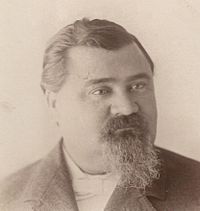T. M. Turner facts for kids
|
T. M. Turner
|
|
|---|---|
| Allegiance | |
| Service/ |
|
| Years of service | 1862–1865 |
| Rank | Musician |
| Unit | Company Band, 5th Virginia Infantry Company Band, 14th Virginia Cavalry |
| Battles/wars | American Civil War |
Thomas Memory Turner (born July 17, 1847 – died September 2, 1917) was an American composer, band leader, and music teacher. His friends called him "Mem."
He was once the assistant leader of the Stonewall Brigade Band in Staunton, Virginia. This band is the oldest community band in the United States that is supported by local government and partly funded by taxes. His father, A. J. Turner, was the band's leader. Memory trained several cornet bands. He also spent some years leading the band at the Western State Hospital, which was a place where people received mental health care.
Early Life and War Service
Thomas Memory Turner was born on July 17, 1847, in Middletown, Virginia. His parents were A. J. Turner and Kate Aby. They moved to Staunton in the mid-1850s.
Musician in the Civil War
Turner served as a musician for the Confederacy during much of the American Civil War. His father, A. J., was a band leader in the Stonewall Brigade Band. Thomas Memory played the cornet alongside his father in the 5th Virginia Infantry from April to August 1862.
Later, he joined the band of the 14th Virginia Cavalry in August 1863. He was taken prisoner and released on April 30, 1865, in Winchester. He was only 17 years old when the war ended.
After the War: Stonewall Brigade Band
After the war, the Stonewall Brigade Band was reformed in 1869. Turner became the assistant leader, and his father remained the main leader.
Life and Music in Different Towns
Turner's life involved moving between several towns, where he continued his musical career.
First Marriage and Charles Town
On February 28, 1872, Turner married Kate Grimes in Warren County, Virginia. They had a daughter named Susan Dorsey Turner in 1874. Around this time, Turner taught the Charlestown Cornet Band.
Time in Lewisburg
From 1876 to 1879, Turner lived in Lewisburg, West Virginia. His son, Charles Augustus Turner, was born there. Turner led the Lewisburg Concert Band, and his sister Cora would sing with them. Besides music, he also worked as a jeweler and watchmaker.
Return to Staunton
In November 1879, Turner moved back to Staunton. He continued to play in the Stonewall Brigade Band. He also led a singing group connected to the band called the "Stonewall Octette."
Turner composed music for special events. For example, he wrote "Hancock's Grand March" for a political rally before the 1880 United States presidential election. After President Garfield was assassinated, Turner composed a sad song called "Garfield's Funeral March."
Watchmaker in Staunton
Turner also ran a jewelry store in Staunton. He fixed watches and jewelry. He also offered his skills to tune musical instruments.
Back to Lewisburg and Hard Times
Turner returned to Lewisburg in 1884 to teach a band. He lived in nearby towns like Alderson and Hinton for a while. His wife, Kate, passed away in Alderson in 1888. His son, Claude, also died in Lewisburg in 1889 at just 14 years old. Both Kate and Claude were buried at the Old Stone Church.
Second Return to Staunton
After these sad events, Turner moved back to Staunton again.
Music at Western State Hospital
He became the leader of the Blackford Cornet Band at the Western State Hospital. This band had ten or eleven male attendants as members. Turner was paid to lead the band and also to tune pianos.
Music was very important at the hospital. One report said, "The music of the Hospital Band helps to ease loneliness and makes life less boring for patients. It has a wonderful effect in calming those who are noisy or troubled. It also brings great joy to the quieter patients and visitors."
Second Marriage
On February 15, 1893, Turner married Virginia Ann "Nannie" Wyatt in Harrisonburg, Virginia. Sadly, she passed away in Staunton in March 1894.
Later Years
From 1896 to 1897, Turner spent time in Baltimore and Gaithersburg, Maryland. In Gaithersburg, he taught a band and attended a reunion of the Central Brass Band, which he had also taught.
Norfolk and Final Years
Later in his life, Turner settled in Norfolk, where he continued to teach music. He passed away there on September 2, 1917.


